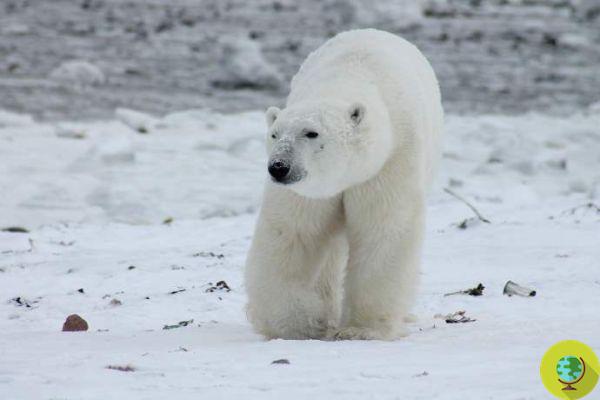Polar bears are dwindling very rapidly and their extinction may be closer than we think. This was revealed by new research conducted by the University of California Santa Cruz in collaboration with the US Geological Survey
Polar bears are dwindling very rapidly and their extinction may be closer than we think. This was revealed by new research conducted by the University of California Santa Cruz in collaboration with the US Geological Survey.
According to the study, the animals are facing an increasing struggle to find enough food to survive as climate change constantly transforms their habitat.
The new study shows that polar bears have higher metabolic rates than previously thought and an increasing number of bears are unable to catch enough prey to meet their energy needs.
Published today on Science, the research reveals the physiological mechanisms underlying the decreases observed in polar bear populations.
Read: #PolarBearDay: so man is wiping polar bears off the face of the earth
“We have documented the decline in polar bear survival rates, the condition of the body and the population over the last decade ", he said first author Anthony Pagano PhD from UC Santa Cruz. "This study identifies the mechanisms that are driving these declines by looking at the real energy needs of bears."
Pagano, who is also a wildlife biologist for the USGS, led the study as part of his PhD, collaborating with Terrie Williams and Daniel Costa, both professors of ecology and evolutionary biology.
The researchers monitored the behavior, hunting success and metabolic rate of adult polar bears without cubs as they hunted on the sea ice of the Beaufort Sea in spring. Special high-tech bear collars recorded videos, locations and activity levels over a period of 8 to 11 days, also monitoring the amount of energy consumed by the bears.
I rates metabolic were on average higher than more than 50% than previous studies had predicted. Five of the nine bears in the study also lost some body mass (up to 20 kg over a 10-day study period), meaning they weren't catching enough fat-rich prey to meet their energy demands.
This all happened from April to July, when polar bears catch most of their prey and put on much of the body fat they need throughout the year.
What does climate change have to do with it?
Unfortunately, their role is of the utmost importance. Global warming is causing Arctic sea ice to melt, forcing polar bears to travel greater distances for food and to spend more energy during the summer, fasting until the ice returns to the continental shelf in the fall.

In other areas, such as Hudson Bay, most bears move to land as sea ice retreats. There, Arctic warming showed its effects in early summer. The ice returns in the fall, forcing the bears to spend more time on the ground.
“In any case, it's a question of how much fat they can accumulate before the ice starts to melt, and therefore how much energy they have to expend,” Pagano said.
USGS researchers have been studying polar bears in the Beaufort Sea since the 80s. Their most recent population estimate indicates that the number has decreased by about 40% over the past 10 years.
"We found that polar bears actually have much higher energy needs than expected, they need to catch a lot of animals," he said.
READ also:
- AN (OTHER) POLAR BEAR DEADNED AND SUFFERING
- SNOW HAS DISAPPEARED IN HUDSON BAY, POLAR BEARS IN DANGER (PHOTO)
- THE TERRIBLE IMAGE OF THE POLAR BEAR FORCED TO HUNT AMONG WASTE
- IT'S NOT A PLUSH, BUT A REAL POLAR BEAR DEAD OF HUNGER (PHOTO)
Hungry, wasted bears. This is not new but now comes the confirmation from science. And their disappearance may be even closer.
Francesca Mancuso


























